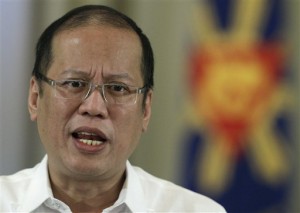FORT DEL PILAR, Baguio City—President Aquino on Sunday pitched for peace, saying negotiations were the only way to resolve the Sabah crisis.
Criticized for not doing enough to end the crisis peacefully, Aquino told the 124 graduating cadets of the Philippine Military Academy (PMA) here that “earnest dialogue is more effective, more productive and more beneficial to all, as opposed to pointing weapons at each other.”
“There are problems that just beget more problems if you try to solve them with haste or force,” Aquino said. “We need sincere and deep discussion if we are to arrive at a correct solution.”
“Forbearance and reason are not equivalent to cowardice. On the contrary, these are the measures of true courage and resolve,” the President said.
“We already know how complicated this issue is. Could any Malaysian prime minister so easily agree to let go of a land that for so long has been subject to their laws?” he asked.
More than 200 followers of Sulu Sultan Jamalul Kiram III crossed to Sabah from Tawi-Tawi in speedboats on Feb. 9 and occupied the village of Tanduao in Lahad Datu town to stake his clan’s ancestral claim to the eastern Malaysian territory.
Fighting with Malaysian security forces broke out on March 1 and according to Malaysian police figures, 62 of Agbimuddin’s men and 10 policemen and soldiers had died in the fighting.
Malaysian authorities have arrested more than 100 Filipinos in Sabah on suspicion of having links to Agbimuddin’s group.
Hundreds of other Filipinos in Sabah have fled to Tawi-Tawi and Sulu to avoid getting caught in the crossfire in the fighting in Lahad Datu.
The Philippine Navy last week intercepted 38 members of Agbimuddin’s group as they tried to reenter the Philippines in two speedboats after fleeing from Malaysian security forces in Sabah.
The government filed criminal charges against the group in a court in Tawi-Tawi.
The fate of Agbimuddin remains unknown. Malaysian police believe he has slipped out of Sabah and fled to Sulu. But his family in Manila insists he is still in Sabah.
Aquino hinted that the Sulu sultanate had hidden backers, saying the incursion in Sabah must have cost a large sum of money.
The Kirams denied they had backing from any group. Their spokesman, Abraham Idjirani, said the sultanate was forced to take action because the government would not act on their claim.
Initial investigation found no evidence of a supposed “conspiracy” among the Kirams, the Moro National Liberation Front (MNLF), allies of former President and now Pampanga Rep. Gloria Macapagal-Arroyo and the political opposition to scuttle a preliminary peace agreement between the Aquino administration and the Moro Islamic Liberation Front (MILF) by creating trouble in Sabah.
But Kuala Lumpur reportedly wants Manila to give information about the intrusion’s links to opposition leaders in the Philippines.
“If reports are true that the intrusion was linked to certain opposition leaders in that country, the Philippine government should take appropriate action against them,” The Star newspaper of Malaysia quoted Deputy Prime Minister Muhyiddin Yassin as saying on Saturday.
Muhyiddin said he had read a statement on the issue by Defense Minister Ahmad Zahid Hamidi, who met Philippine Defense Secretary Voltaire Gazmin in Kuala Lumpur on Friday.
“We hope they will provide us detailed information on the matter as we want to know the true situation behind the intrusion,” Muhyiddin said.
President Aquino lashed out at the people who provoked the crisis, saying they had put 800,000 Filipinos working and living in Sabah in harm’s way.
“Whether or not the sultanate’s claim to Sabah is legitimate, how can this be weighed against the lives and employment that would be imperiled if outright conflict between [the Philippines and Malaysia] starts?” Aquino asked.
“We all know that every action has a resulting reaction, and there are problems that cannot be solved using guns,” he said.
The crisis entered the fifth week on Saturday, with no signs that a peaceful resolution to the crisis is coming soon.
‘Aggressive diplomacy’
Supporting the President’s stand, Interior Secretary Manuel Roxas said “aggressive diplomacy” was the only viable option for the Philippines to end the crisis.
“[Let’s] continue … reaching out and [appealing] to Malaysia,” Roxas said in a text message to the Inquirer.
He said communication lines between President Aquino and Malaysian Prime Minister Najib Razak remained open.
Secretary Herminio Coloma of the Presidential Communications Operations Office agreed that diplomacy remained the best way to end the crisis.
After all, Coloma said, Malaysia has been a longtime partner of the Philippines in bringing about peace in Mindanao.
Preacher Eduardo Villanueva criticized Malaysia on Sunday for the reported abuses against Filipinos in Sabah during a crackdown on suspected supporters of Agbimuddin’s group.
“Malaysia’s iron-clad laws have no space in a democratic society,” Villanueva, a senatorial candidate in May’s midterm elections, said.
Malaysia is looking into the reported abuses against Filipinos in Sabah.
Malaysian Attorney General Abdul Gani Patail said in a statement on Friday that the police were investigating all reports made regarding the intrusion and not just the alleged maltreatment of immigrants from the Philippines.
“The Malaysian security forces have neither targeted nor launched a specific crackdown on immigrants from the Philippines,” he said.
“I acknowledged that there have been some immigrants who were apprehended during [the military operations],” he said.
But the arrest of the immigrants was “purely incidental to the ongoing operations against the intrusion,” he said.—With reports from TJ Burgonio, Jerry E. Esplanada, AFP and The Star/Asia News Network
Originally posted at 04:42 pm | Sunday, March 17, 2013
